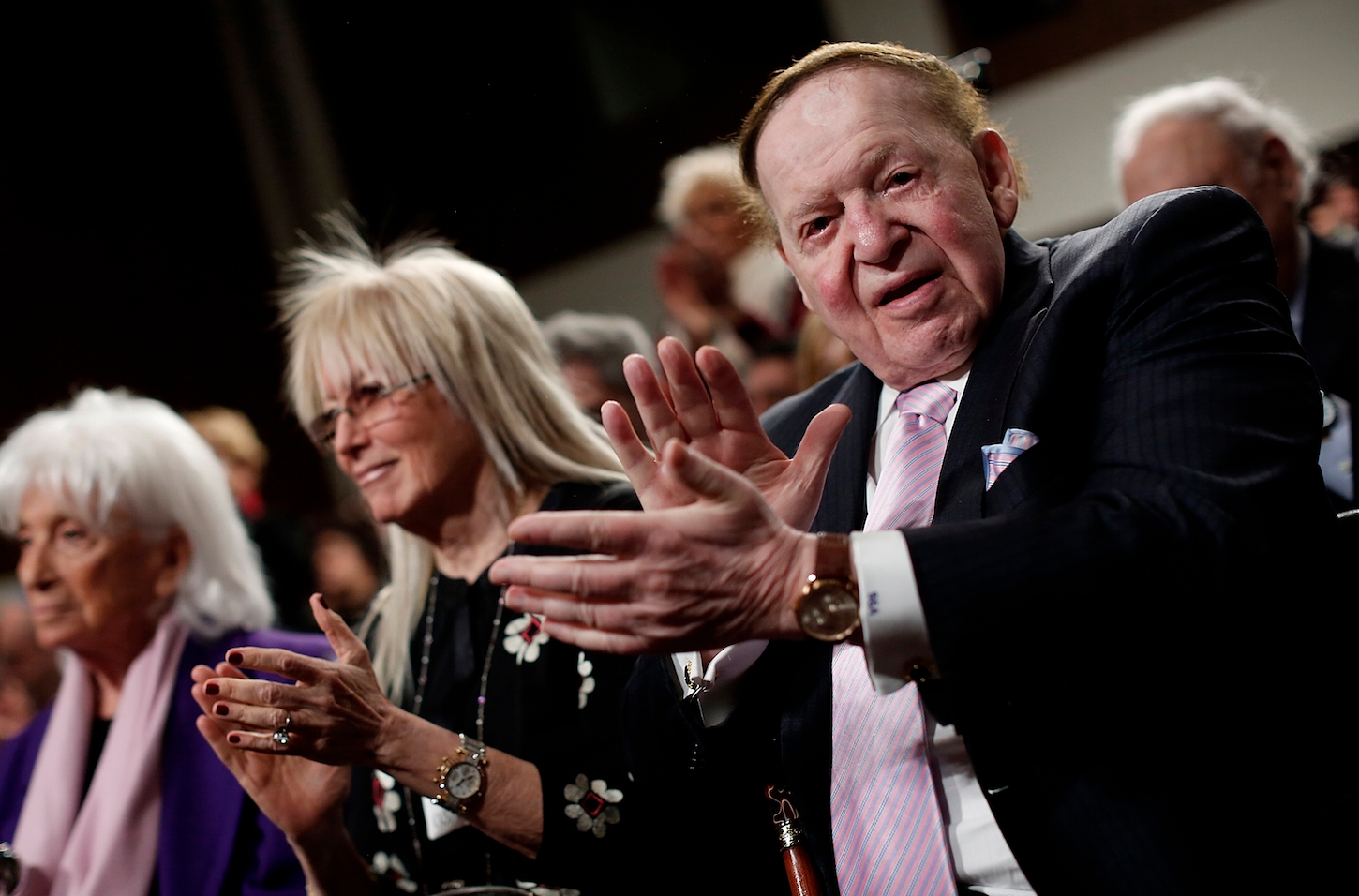3 strategies for Sheldon Adelson in dealing with the Trump conundrum
Published December 15, 2015

Sheldon Adelson and his wife, Miriam, gave $40 million to the failed presidential candidacy of Republican Newt Gingrich in 2012. The Adelsons have thus far declined to support a 2016 Republican candidate. (Win McNamee/Getty Images)
WASHINGTON (JTA) – For months, Republican Party insiders have speculated who Sheldon Adelson, the pro-Israel billionaire, will back in the GOP presidential primary.
Now there’s a follow-up question: How does Donald Trump’s continued perch atop the polls scramble the casino magnate’s calculations?
In 2012, Adelson and his wife, Miriam, backed Newt Gingrich to the tune of $40 million. Insiders say that money forced eventual candidate Mitt Romney to spend dollars fending off Gingrich – expenditures that helped cripple Romney’s efforts against incumbent Barack Obama in the general election. Republicans who have communicated with Adelson say the billionaire is loath to repeat that experiment and wants to be sure of a front-runner before he steps in.
But Trump, the maverick real estate billionaire and reality television star, is rewriting the script. Establishment Republicans and the party’s Jewish donor base fear that his impolitic outbursts and alienation of constituencies being courted by the GOP may destroy the party.
Adelson’s office declined comment, and Adelson has never said on the record what he thinks of Trump. Sources close to Trump, however, leaked to Politico last month that there was a time when Trump sought the backing of Adelson.
After speaking with a number of GOP operatives, including several who back Trump’s rivals, here are three possible strategies for Adelson.
Save it for the general election
Reports suggest that the Adelsons are down to deciding between backing Sens. Marco Rubio of Florida and Ted Cruz of Texas. Miriam Adelson favors Cruz, while Sheldon Adelson favors Rubio, according to Yahoo News. Both candidates are rising in the polls and have been targeted by Trump in his stump speech.
Backing one or the other now would be a zero-sum game: Like with Gingrich in 2012, whoever receives the money could inflict serious damage on the eventual nominee. Meanwhile, Trump, who has benefited from media attention money can’t buy – and who has plenty of his own cash, should he need to start spending seriously – would emerge unscathed.
A number of factors – the growth of social media, surging grassroots resentment of the establishment and Trump’s ability to command free media attention for every outrageous utterance – have conspired to render fundraising far less useful in the primaries. Former Florida Gov. Jeb Bush is flush with cash, yet remains stranded in the single digits in polls. All that may change as the actual voting nears, but as Bush can attest, trying to stop Trump with cash seems to be a case of throwing good money after bad.
Give it to a SuperPAC
The Adelsons may be able to spend against Trump, while avoiding favoring another candidate, by giving to a SuperPAC, political action committees that allow unlimited spending against a candidate.
One contender could be Club for Growth Action, the SuperPAC affiliated with the famed anti-tax group, which already has targeted Trump for his calls to tax the super-rich.
One smart move for Adelson might be to back a SuperPAC that strategically targets Trump in states where he may be vulnerable, like Florida, whose March 1 primary is considered a must-win for native son Rubio.
Crush him – now
Waiting out Trump might seem tempting, but there are reasons Adelson might want to bash Trump early and often. The prospect of Trump as the Republican nominee spooks establishment Republicans in general, but Adelson and other donors for whom Israel is the premier issue have specific reasons for fearing his candidacy.
Trump could drive away moderate Republicans from the polls and galvanize minority voters repelled by his rhetoric. That would be a disaster for pro-Israel Republicans in Congress who face tough reelection campaigns, chief among them Sens. Rob Portman of Ohio and Mark Kirk of Illinois.
Trump has also refused to toe the line that pro-Israel Republicans expect from their candidate. At the Republican Jewish Coalition’s candidates forum earlier this month, Trump made headlines for joking about the wealth and business prowess of those in attendance. But more substantively, Trump raised eyebrows by blaming Israel in part for the impasse in peace talks with the Palestinians, and would not commit to moving the U.S. Embassy to Jerusalem and keeping the city as Israel’s undivided capital.
This entry passed through the Full-Text RSS service – if this is your content and you’re reading it on someone else’s site, please read the FAQ at fivefilters.org/content-only/faq.php#publishers.















